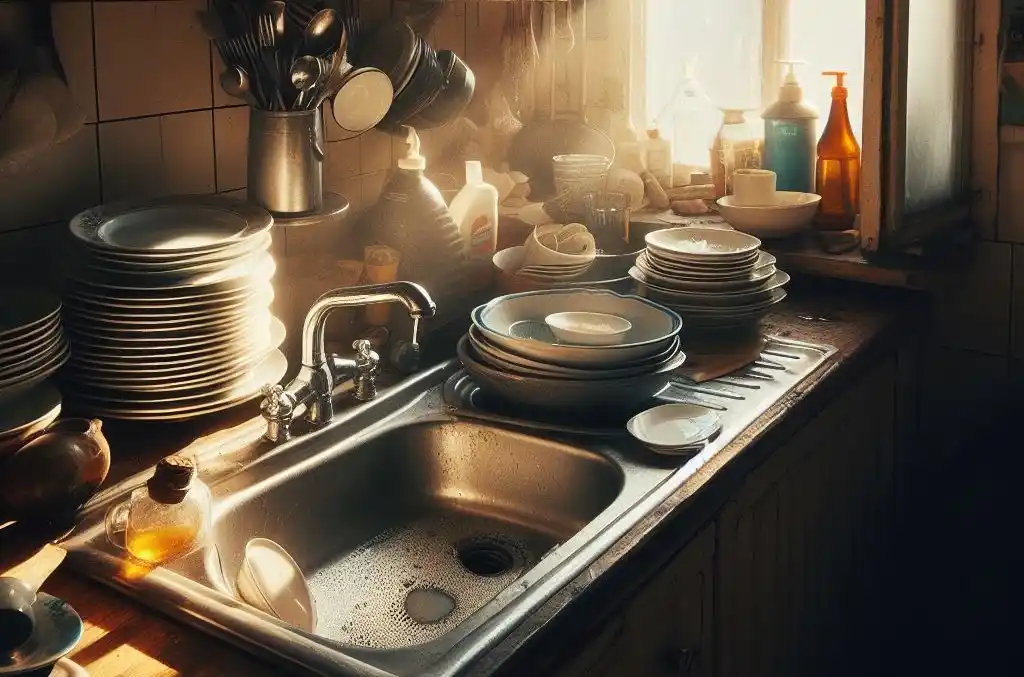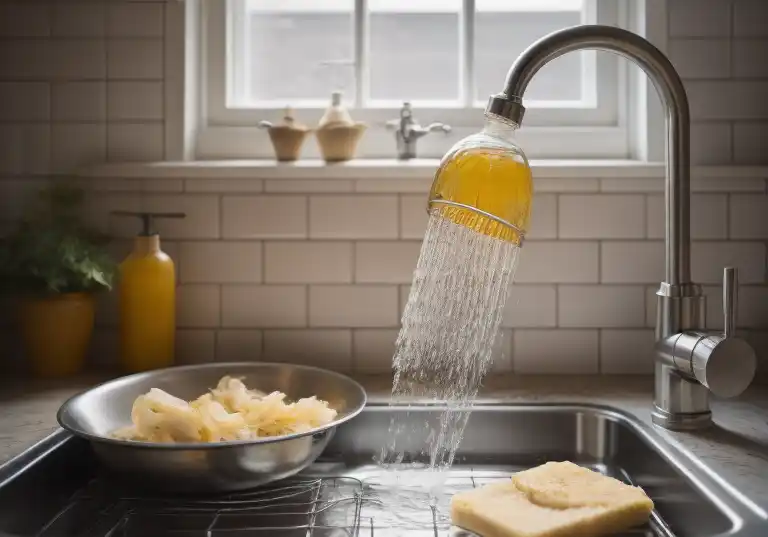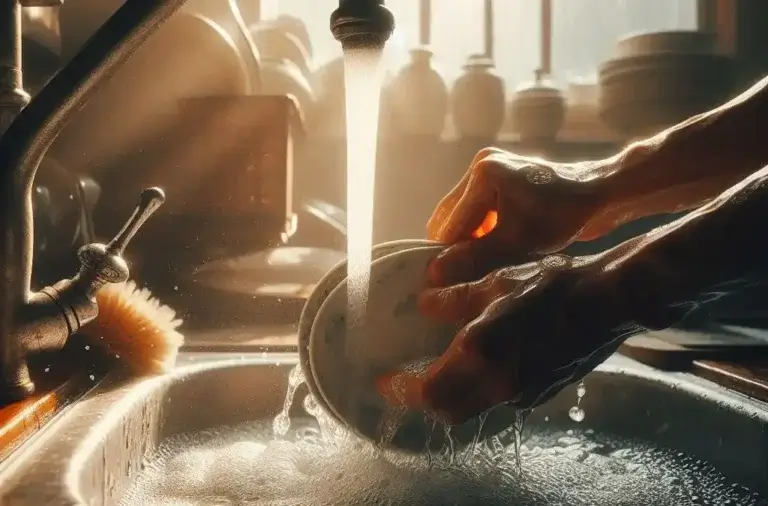Can You Use Hand Soap to Wash Dishes? The Dos and Don’ts
Have you ever found yourself staring hopelessly at a sink full of dirty dishes, only to realize you’ve run out of dish soap? We’ve all been there. When you’re out of dish soap and need to wash dishes, it’s tempting to grab the nearest bottle of hand soap instead. But is hand soap an effective dish soap substitute?
In a dishwashing emergency, hand soap can be a temporary substitute, but only for lightly soiled dishes. Use it sparingly and rinse thoroughly. When it comes to regular dishwashing, stick to the dedicated sudsmith – dish soap. It’s specially formulated for the job, ensuring your dishes are clean, greasy-free, and safe for enjoying your next meal.
In this comprehensive guide, we’ll cover everything you need to know about can you use hand soap to wash dishes, including:
- The main differences between hand soap and dish soap
- Whether or not hand soap can effectively clean dirty dishes
- Possible downsides of using hand soap on dishes
- Tips for washing dishes without dish soap
- Homemade dish soap recipes
The Key Differences Between Hand Soap and Dish Soap
While hand soap and dish soap may seem interchangeable, there are some important distinctions:
Ingredient Formulas
Hand soap is formulated to be gentle on the skin. It often contains moisturizers like glycerin and lacks harsh cleansing agents. Dish soap contains stronger surfactants to cut through tough grease and food residue. The antibacterial additive triclosan is also commonly found in dish soap.
Cleaning Strength
The skin-safe formula of hand soap makes it less effective at powering through stuck-on food and grease on dishes. Dish soap is specially designed to dissolve oil and emulsify grime to be rinsed away. The cleaning agents in dish soap also help sanitize dishes.
Scent and Suds
Hand soap is typically lightly fragranced, while dish soap tends to have stronger scents. The increase in surfactants also makes dish soap more sudsy. Lots of suds help lift and sweep away food debris. Hand soap produces fewer suds to prevent over-drying skin.
Can You Use Hand Soap to Wash Dishes?

Now that we know the difference, the big question is—can you use hand soap in a pinch to wash dirty dishes? The short answer is yes, but results may vary.
The Pros
- It’s better than nothing. Hand soap will make dishes cleaner than just water alone. The soap helps lift some grease and stuck-on food debris.
- It saves a trip to the store. If you’ve just got a few dirty dishes, using up your hand soap is convenient before running out of dish detergent.
- It works in a dishwasher. The stronger wash cycle helps compensate for the milder formula of hand soap.
The Cons
- It might not fully clean dishes. Hand soap often lacks the grit and grease-cutting strength needed to remove all food residue baked onto pans.
- You may need to rinse longer. Without the advanced degreasers, hand soap requires more thorough rinsing to prevent streaky residue.
- It can waste soap. Weak suds mean you might over-pour hand soap trying to wash dishes effectively.
Tips for Washing Dishes Without Dish Soap
While hand soap may work in a pinch, there are even better ways to wash dishes when you’ve run out of detergent. Here are some handy methods to try:
Baking Soda and Water Paste
Baking soda is a natural deodorizer and cleaning agent. For light to moderately soiled dishes, make this simple paste:
- Add 1/2 cup baking soda to a couple of tablespoons of water and mix into a spreadable paste. Apply to dishes and let sit briefly before washing with a sponge or cloth. Rinse thoroughly afterward.
Vinegar Soak
White vinegar helps dissolve soap scum and loosen stuck-on food. For tougher baked-on grease, try this vinegar method:
- Fill your sink with warm water and 1 cup of white vinegar. Place extremely dirty pans or dishes to soak for 30 minutes up to a few hours. Scrub and rinse.
Rubber Glove Massage
The texture of rubber dish gloves helps scrub away stubborn food. Simply fill the sink with warm water, put on rubber gloves, and massage dirty dishes with your fingers to dislodge residue before rinsing.
Can You Use Dish Soap as Hand Soap?
On the flip side, say you’ve got leftover dish soap but are out of hand soap. Is it OK to use dish soap to wash your hands? The answer is technically yes, but take caution.
Dish soap contains much harsher ingredients that strip natural skin oils. With frequent use, this can cause:
- Dry, cracked hands
- Irritation and inflammation
- More infections as skin barriers weaken
For occasional use, lather a tiny amount of dish soap with plenty of water. Rinse very thoroughly after washing and follow up with a gentle moisturizer. Baby oil or petroleum jelly helps counteract drying effects.
But for everyday hand hygiene, it’s best to use a gentle, skin-safe hand soap or soap alternative like castile soap. Look for options with added skin conditioners and without antibacterials.
What Can I Use to Wash Dishes Instead of Dish Soap?

If you find yourself in a suds-less situation, fret not! While dish soap is certainly the reigning champion, a few trusty alternatives can get your dishes squeaky clean. Here are some natural and readily available options, each with its strengths and limitations:
Natural Powerhouses:
- Baking soda: This versatile pantry staple is a gentle yet effective cleanser. Make a paste with baking soda and water, scrub your dishes, and rinse thoroughly. Great for removing mild stains and food residue, especially effective on greasy messes.
- Vinegar: White vinegar’s acidity cuts through grime and deodorizes. Dilute it with water (1:1 ratio) for soaking dishes or spraying, then rinse well. Perfect for glassware and greasy splatters, but avoid using on aluminum or cast iron.
- Lemon juice: Similar to vinegar, lemon juice’s natural acids tackle grease and stains. Cut a lemon in half, use it directly on dishes, or rinse with diluted lemon juice. A good substitute for vinegar, but be gentle on delicate surfaces.
Combo Cleaners:
- Baking soda + vinegar: This dynamic duo amplifies each other’s cleaning power. Sprinkle baking soda on dirty dishes, spray with vinegar, let it fizz and scrub, then rinse. Tackles tough stains and grease, but use caution on delicate surfaces.
- Salt + boiling water: For burnt-on messes, this abrasive combo works wonders. Sprinkle salt on the burnt area, pour boiling water, and let it soak. Scrape off the loosened residue and rinse thoroughly. Ideal for pots and pans, but not suitable for delicate dishes.
Other Options:
- Castile soap: This gentle, plant-based soap can be used for dishes in a pinch. Dilute it with water, use it like regular dish soap, and rinse thoroughly. Be aware, it may not be as effective as regular dish soap on greasy messes.
- Bar soap: Some unscented bar soaps can work for dishes, but choose non-moisturizing varieties and rinse well. Not as effective as other options, but a temporary substitute in a bind.
Remember:
- Always test any alternative on a small, inconspicuous area of your dish first.
- Rinse thoroughly after using any dish-cleaning alternative.
- Consider the type of dishes you’re cleaning and choose the appropriate alternative.
- For heavily soiled dishes or regular cleaning, dish soap is still the best choice for optimal cleaning and sanitation.
With these alternatives in your cleaning arsenal, you’ll be prepared to tackle any dishwashing dilemma, even when the suds run dry!
Can I Wash Dishes With Laundry Detergent?
While technically possible in a dire pinch, it’s highly discouraged to wash dishes with laundry detergent. Here’s why:
Safety Concerns:
- Harsh chemicals: Laundry detergents often contain strong chemicals and bleaching agents not meant for food contact. Ingesting residues can be harmful or irritate skin.
- Incomplete rinsing: Laundry detergents may not rinse as easily as dish soap, leaving traces on dishes that can contaminate your food.
- Fragrances and dyes: Many laundry detergents contain fragrances and dyes not found in food-safe dish soaps, potentially altering the taste and smell of your food.
Cleaning Efficacy:
- Ineffective on grease: Laundry detergents may struggle with greasy messes common on dishes, leaving a film behind.
- Suds overload: Laundry detergents produce excessive suds, potentially overflowing sinks and creating a messy situation.
- Dish damage: Strong chemicals in laundry detergents can damage delicate dishes, causing fading, discoloration, or even corrosion.
Alternatives:
If you find yourself without dish soap, consider these safer and more effective alternatives:
- Baking soda: Gentle yet effective at removing food residue and mild stains. Make a paste with water and scrub.
- Vinegar: Cuts through grime and deodorizes. Dilute with water (1:1) for soaking or spraying, then rinse well. Avoid aluminum or cast iron.
- Lemon juice: Similar to vinegar, lemon juice’s acidity tackles grease and stains. Use directly on dishes or rinse with diluted juice. Be gentle on delicate surfaces.
- Castile soap: Plant-based, gentle soap suitable for dishes in a pinch. Dilute with water and rinse thoroughly.
Remember:
- Dish soap is specifically formulated for safe and effective dishwashing.
- Alternatives should only be used temporarily and with caution.
- Rinse thoroughly after using any substitute.
Ultimately, stick to dish soap for regular dishwashing to ensure clean, safe dishes for your meals. It’s always better to be safe than sudsy and sorry!
Can I Use Shampoo to Wash Dishes?
Imagine this: you’re whipping up a culinary masterpiece, and the last thing you need is a sink full of dirty dishes mocking your efforts. But alas, you reach for the dish soap… only to find an empty bottle staring back at you. Panic sets in. Could that fancy new shampoo you just bought double as a dishwashing hero?
Hold your horses, sudsy friend! While technically possible in a hair-raising emergency, using shampoo for dishes is a recipe for disaster. Let’s unravel the tangled mess of why it’s best to keep your shampoo in the shower and reach for a trusty bottle of dish soap instead:
Safety Siren:
- Toxic Tango: Shampoos often contain harsh chemicals and surfactants not meant for food contact. Imagine tiny sudsy villains infiltrating your food, potentially causing gastrointestinal distress or worse.
- Rinsing Ruckus: Shampoo’s not designed to say goodbye easily. Its lingering residue can contaminate your dishes, leaving an unwelcome aftertaste of your latest floral fragrance.
- Fragrance Faux Pas: Many shampoos boast delightful scents, but trust me, you don’t want your food infused with the aroma of a tropical paradise. Keep those fruity notes for your locks, not your forks!
Cleaning Calamity:
- Grease Gone Rogue: Forget cutting through greasy battleships. Shampoos lack the grease-busting power of dish soap, leaving your dishes with a slippery, unpleasant film.
- Sudsy Tsunami: Picture your sink overflowing with mountains of shampoo suds. Not only is it messy, but it’s also a waste of precious water. Remember, suds don’t equal cleanliness!
- Dishware Disaster: Shampoo’s conditioning agents can wreak havoc on delicate dishes, leaving them filmy or even damaged. Your favorite grandma’s china deserves better than a sudsy shampoo bath!
So, what are your sudsy sidekicks when dish soap deserts you?
- Baking Soda Bonanza: This gentle giant tackles mild stains and food residue with ease. Just whip up a paste with water and scrub away!
- Vinegar’s Tangy Triumph: This acidic powerhouse cuts through grime and deodorizes like a champ. Dilute it with water and say goodbye to greasy ghosts! ✨
- Lemon Zest: Embrace the citrusy power! Lemon juice’s acidity works wonders on stains and grease. Just slice a lemon and get scrubbing (gently, on delicate surfaces!).
Remember, these alternatives are temporary heroes; dish soap is your true knight in shining armor for everyday dishwashing. It’s specially formulated to be safe, effective, and kind to your dishes. ️✨
So, the next time you face a dishwashing dilemma, resist the urge to grab the shampoo. Stick to the sudsy specialists and keep your meals (and your stomach) happy and healthy! ️
Frequently Asked Questions About Hand Soap for Dishes
Here are answers to some other common questions about using hand soap as an emergency dish detergent:
Is hand soap toxic if ingested from dishes?
In small amounts, ingesting hand soap residue isn’t generally dangerous. But hand formulas may contain compounds like parabens and antimicrobials that are concerning in large, frequent doses. Overall, it’s smartest to just use regular dish soap which is designed to be food-safe.
Can I add hand soap to my dishwasher instead of detergent?
You could try adding hand soap to your dishwasher’s detergent compartment. But without built-in rinse agents, you may end up with lackluster results and filmy buildup over time. Stick to formulated dishwasher detergents for best performance.
How can you make your own dish soap that works well?
Making your own liquid dish soap is easy with just a few ingredients! Simply mix 1/2 cup Sal Suds or castile soap with 1 tablespoon washing soda, 10-15 drops of essential oil (for scent), and enough water to fill a 16 oz soap dispenser. This recipe rivals store variety in grease-cutting power!
Conclusion: Choose the Right Soap for the Job
While hand soap may work in a pinch to wash dishes, it’s important to use the soap specifically formulated for the task. The skin-gentle formula of hand soap simply isn’t strong enough to power through tough, greasy buildup the way dish soap can. For best results cleaning dirty dishes, always reach for dish soap made to cut through grime fast.
But if you’re ever caught empty-handed and need to wash dishes without soap, try the handy baking soda or vinegar tricks instead. And be very careful using harsh dish soap on your hands over time. The antimicrobials and degreasers, while helpful on plates, can seriously irritate skin and disturb healthy hand microbiomes.
We hope this guide gave you useful insight into hand soap versus dish soap! Let us know if you have any other questions in the comments. And don’t worry—we’ve all been in a pinch washing dishes without the proper detergent before.








